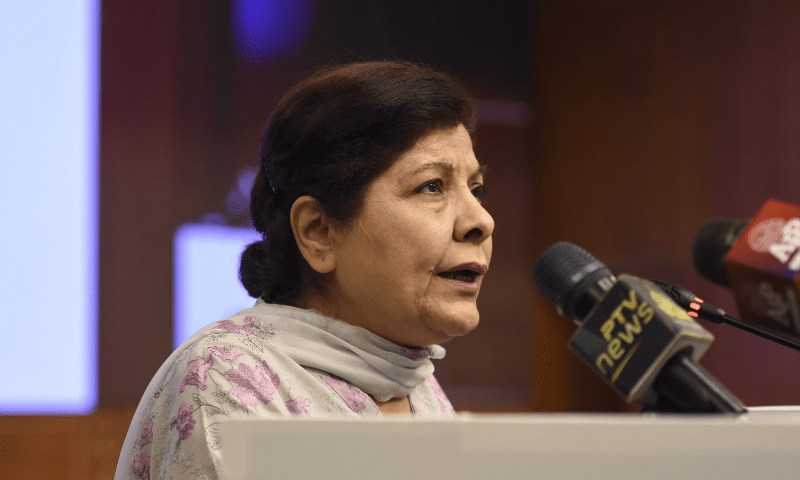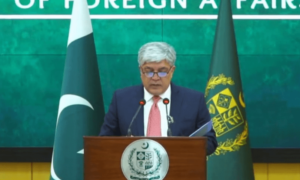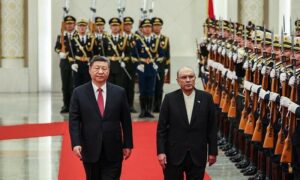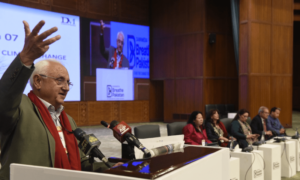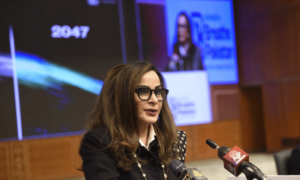At Islamabad conference, Justice Mansoor Ali Shah says heatwaves making some Sindh regions unliveable
A global climate conference under DawnMedia’s ‘Breathe Pakistan’ initiative is under way right now at Islamabad’s Jinnah Convention Centre, bringing together experts and leaders to find solutions to climate change.
The two-day moot aims to make Pakistan climate-resilient by 2047 while fostering regional cooperation across South Asia, where countries face shared challenges of rising temperatures, water scarcity and increasing natural disasters.
1:14pm: World Bank climate change head takes the podium
Valerie Hickey, the global director for climate change at the World Bank, is now speaking as the session ‘Pakistan’s critical need for climate finance’ continues.
Hickey appreciated the speakers’ insights as “brilliant inputs”.
Summarising the discussions so far, the World Bank official said six points stood out.
12:53pm: Former SBP governor Raza highlights importance of emission ceilings
Ex-SBP governor Raza spoke about how emissions ceilings have led to many companies searching for ways to cut emissions.
“And if they’re over it, they have to pay a penalty or they go and buy credit from someone who is under the gap — and that’s the carbon trading market.
“That compliance trading market today is about worth $800bn. That is all private activity. This is the compliance market.”
Raza further said there was a “voluntary trading market, which is not a regulated market, but it is for people who seek to buy carbon credits to offset their excess when they go outside their own countries”.
“There’s a large part of the world covered by these requirements: all of the EU, Canada, China, Japan, New Zealand, parts of America — California, 11 northeastern American states — all have this system of caps and trading.”
12:51pm: Ex-SBP governor Salim Raza addresses the event
Ex-SBP governor Salim Raza is currently speaking on the theme of climate finance.
“I want to point out one sole reality: which is the expectation that private finance — private finance, not public finance — is going to pull the cart. But they aren’t.”
He then showed on screen an estimate for how much private finance has to increase in the next five years compared to what it is today. “It is 15-18 times in external finance and five-to-seven times in money raised domestically.”
12:38pm: Ex-SBP governor Shamshad Akhtar says climate change ‘lethal threat’
Shamshad Akhtar, the former governor of the State Bank of Pakistan, spoke on climate finance, expressing that it has been her “passion”.
“I think unless we address this very lethal threat that faces the global community and the global landscape, we are not going to get anywhere. And we will face economic disruption.”
12:35pm — Aurangzeb highlights funding for climate initiatives
The finance minister also spoke about the green climate funds, praising Acumen’s $90m initiative. “My only discussion with respect to green climate funds is that it just takes a long time.”
He added: “We have a bureaucracy here in Islamabad. But I do think the bureaucracy in Manila should think through it because we need to fast-track a few things. My humble request is that they should look at their accreditation process even before we come to the pledges and disbursements.”
The finance minister then walked the participants through other climate initiatives. On multilateral lenders, Aurangzeb said he met World Bank President Ajay Banga and talked about many things where they needed the Bank’s support.
He said: “We’re very grateful to the Asian Development Bank […] they announced $500m and climate is a big part of that theme. The second one is what was announced in January […] the 10-year country partnership framework with the World Bank group.”
12:30pm: Finance minister says adaptation greater issue than mitigation
Aurangzeb: “While we need to deal with mitigation, the real issue — and bigger issue — is adaptation.
On climate financing, Aurangzeb said it was “good to see some level of operationalisation coming through in COP29 with about $720m in the Loss and Damage at least being pledged”.
“Then the Baku finance goal itself, after long deliberations, about $300bn of annual outlays.
“But of course, as you all know, the requirement was three to four times higher than this commitment,” he added, highlighting the low funds pledged at the COP29 in Baku last year.
12:23pm: Minister Aurangzeb says tackling climate change about ‘how and who’
Finance Minister Muhammad Aurangzeb has taken the stage now to detail Pakistan’s climate change issues as a session titled ‘Pakistan’s critical need for climate finance’ begins.
“In terms of the sustainability of Pakistan, and our overall economic situation in the country, it will ultimately depend upon two existential issues and how we deal with those.
“One is population control and population management. Unfortunately, we’re still growing at a rate of 2.5pc,” the minister noted.
On climate change, he said: “We’ve known the what and why. There’s no dearth of policy prescriptions. It’s ultimately about the how and who.”
WATCH: Information Attaullah Tarar says Pakistan among worst-affected
12:20pm — Break
12:13pm — Justice Shah says some term lack of support from North ‘climate apartheid’
During his speech, Justice Shah also called on the Global North to support the vulnerable countries in the Global South “not as charity but as a legal and moral obligation”.
He added, “The gap between developing and developed nations will grow, leading to what some people term as ‘climate apartheid’ where wealthy nations protect themselves from climate impacts while poorer countries are left to bear the brunt.”
12:00pm — Justice Shah says climate finance ‘critical’ to climate justice
Justice Mansoor Ali Shah stated: “Climate justice today, how the judiciary feels, is climate finance. Without adequate funding, adaptation remains an aspiration rather than a reality.
“The most vulnerable country to bear the brunt of climate disaster, we soon realised after the devastating 2022 floods that the only way forward is through climate finance.”
“Delay in financing is not just a policy failure, it is a denial of justice.”
Calling climate financing a human rights issue for Global South, he said, “The ability to adapt, recover and rebuild in the face of climate disaster is not a privilege.”
He added: “The right to life and dignity in our constitutions and international frameworks must now include the right to climate finance. Without it, our people are left defenceless against a crisis they did not create.”
11:50am — ‘Climate justice a multi-sectorial issue’
Justice Mansoor Ali Shah pointed out that while the Global North focused on mitigation, which was emission control, the Global South had a “very broad canvas”.
“This transformation makes climate justice a multi-sectorial issue for the Global South.
“The ambit of climate justice […] now includes water security, agriculture, food security, disaster risk reduction, health, urban planning, infrastructure, ecosystems and diversity, energy, finance and climate. The scope totally changes.”
11:47am — Justice Shah lists 9 ‘pillars’ for climate justice
The SC’s senior puisne judge further said: “We must realise that Global South faces a dual injustice — first the disproportionate burden of climate impacts and second, the structural barriers that limit their ability to respond effectively.”
He then went on to list “nine pillars on how to structure climate justice” — the first being a “strong focus on adaptation and loss and damage”. “Mitigation is not our immediate issue.”
“Second, a robust, active and well-informed judiciary, and I hasten to add: an independent one also, which is fast-eroding here,” Justice Shah said.
Other points he mentioned included ensuring that climate finance was readily available, nature finance, climate science to ensure policies are evidence-based, and climate diplomacy to forge alliances.
The seventh “pillar” he highlighted was investing in home-grown solutions rather than waiting for external help, while the eighth and ninth were climate accountability and climate courts, respectively.
11:43am — Justice Mansoor Ali Shah says heatwaves making some Sindh regions unliveable
Justice Mansoor Ali Shah says: “Extreme heatwaves and droughts, rising temperatures such as 50°C plus heatwaves in Jacobabad are making some regions unliveable.”
He highlighted that “agriculture employing almost 40pc of the workforce was suffering from erratic monsoons, leading to food insecurity, displacement and economic instability”.
11:41am — Justice Mansoor Ali Shah says melting glaciers put Pakistan at risk of water scarcity
Addressing the event, Supreme Court senior puisne judge Justice Mansoor Ali Shah highlighted that the Hindu Kush Himalaya glaciers, which Pakistan relied upon, were melting at “alarming rates”.
“This threatens the Indus River system, the lifeline of Pakistan’s agriculture, pushing the country to severe water scarcity.”
The judge said: Climate change is no longer a distant threat — this needs to be understood — it is a present and escalating crisis particularly for countries in the Global South and my emphasis is going to be on the Global South today.
He said the Global South, including Pakistan, contributed the least to the global emissions but bore the brunt of it.
“Pakistan is a frontline state of climate catastrophe and is ranked among the top five most vulnerable countries experience extreme weather events.”
Justice Shah said: “I don’t need to go into examples, but floods and disasters […] in 2022, floods submerged one-third of the country, displacing 33m people and causing $30bn in damages […] exposing the urgent need for climate adaptation and finance.”
11:39am — UNDP Pakistan representative
Speaking at the event, UNDP Pakistan representative Samuel Rizk said “no amount of alarm, or advocacy is too much” to counter climate change.
“It is no longer someone else’s business happening on the other side of the world. it is not something for tomorrow, it is something for now, something for all of us. It is everyone’s business.”
He appreciated the government’s efforts for “tackling climate change head-on”. “Pakistan’s voice on global climate diplomacy is clear,” Rizk said.
“Beyond science, policy or activity, there is little doubt that climate justice and climate insecurity can be the new fault line. At the very least, it can be a new place of global convergence of the discourse.
“To contextualise the discussion, the critical role of legal and institutional mechanisms in shaping climate justice cannot be overstated.”
11:35am — KP CM says ex-premier Imran “championed” climate change
“Our leader Imran Khan has championed climate change, nationally and internationally. Since 2017 till now, we have spent more than 675 million rupees in Khyber Pakhtunkhwa to improve and increase our forest area.
“The international standard is 25pc but [Khyber] Pakhtunkhwa is now 26pc. It means we have achieved the international standards and are above it.”
11:27am: KP CM Gandapur takes the podium
Khyber Pakhtunkhwa Chief Minister Ali Amin Gandapur has taken the podium to address the event.
“You must have heard about Khyber Pakhtunkhwa regarding terrorism […] but today I am here to portray the contribution our province and our people are giving to the country,” CM Gandapur said.
He noted that 37pc of KP’s land was forest area and it made up 40-45pc of the forest cover of Pakistan. He highlighted, “As a carbon sink, were are removing 50pc of the carbon of Pakistan.”
“According to the UNDP and World Bank research, for this much forest area, we need at least 332 billion rupees per year. I am not able to invest this much money but at least my province and my people are able to do a job of this big amount.”
Interview with UN’s Mohamed Yahya
UN Resident and Humanitarian Coordinator Mohamed Yahya is giving an exclusive interview to DawnNews English.
“Not only are you not meeting the goals but are constantly being pushed back because of the climate change issues,” he said.
“The mitigation part is important but the adaption is the biggest thing essentially,” he emphasised.
Watch the full interview here:
11:01am — 15-minute break
10:48am: World Bank climate change head speaks
Valerie Hickey, the global director for climate change at the World Bank, has begun addressing the event.
“There will be too many people who die if we wait for the global north to put on the table all of the money that they morally probably should,” Hickey says.
Referring to conversations under the Paris Agreement under the New Collective Quantified Goal, she said, “We’re great at coming up with acronyms on climate change — the NCQG.”
“To move from $100bn to $300bn. It sounds like a lot of money. It’s not. Most of it is in lending. It’s not in grants. Most of it is already there. It’s not addition.”
“I propose we change the name of this conference from Breathe Pakistan to Lead Pakistan,” says Hickey.
10:40am — Yahya addresses the event
Mohamed Yahya, UN Resident and Humanitarian Coordinator, is now addressing the event.
“Climate change is no longer a distant threat. It is happening now. […] As [UN chief] Antonio Guterres has recently stated ‘We are on the highway to the climate hell with our feet still on the accelerator’,” he said.
Noting that global emissions were still on the rise, he highlighted how extreme weather events such as droughts, wildfires and floods were becoming “more frequent, intense and more devastating”.
Recalling the 2022 monsoon floods which submerged one-third of the country under water, Yahya asserted: “A disaster of this magnitude should have been a wake-up call for the world, yet the emissions continue to rise.”
“We must demand climate finance that is predictable, accessible, adequate and fair. The era also of corporate and national impunity must come to an end. Our secretary-general has called on polluters to do more to be part of the solution.”
10:31am — Ahsan Iqbal says climate change ‘lived reality’
Planning Minister Ahsan Iqbal has told the conference that climate change is not some distant challenge but a lived reality.
Referring to the Breathe Pakistan conference, Iqbal said it was not just a discussion [but] a call to action.
“We must move from awareness to impact, policy to execution and from independent efforts to collective responsibility,” the minister stressed.
Pointing out that climate change contributed to less than 1pc to global but still was among the most-affected nations, Iqbal said: “We have endured catastrophic floods, rapid glacial melts, scorching heat waves and crippling droughts — all intensifying in frequency and severity.”
“As the renowned environmentalist Wendell Berry once said, ‘The earth is what we all have in common’ and yet this common home is under siege. Not just in Pakistan but across the world.”
He also stressed that another stark reminder of our environmental crisis was smog, which has become a “recurring national emergency”. “Smog is not just a national issue it is also a cross-border challenge as air pollution knows no borders.”
10:26am — Hameed Haroon addresses the conference
Hameed Haroon, the CEO of the Dawn Media Group, is addressing the conference, alongside Nazafreen Saigol Lakhani, the CEO of Pakistan Herald Publications Private Limited (PHPL).
“The amplification [of Breathe Pakistan] becomes important when you come here because your views and interaction with Pakistani policymakers and NGOs is what will determine the mix of opinions that this country will talk about,” Haroon stressed.
“Climate change is not just an event. As Nazafreen’s idea […], it’s a belief, it’s an ideology and we hope to work with you in the next few years to make partial, if not highly achieved resilience through a very sharp system of climate mainstreaming, a reality.”
10:18am — Conference kicks off
The conference has begun, with the national anthem being played, followed by the recitation of the Holy Quran.
10:15am — Planning, information ministers arrive
Planning Minister Ahsan Iqbal and Information Minister Attaullah Tarar have also reached the centre to attend the conference.
9:40 — Guests arrive at the venue
Guests have started to arrive at the Jinnah Convention Centre as the conference is set to begin.
Harjeet Singh, global engagement director for Fossil Fuel Non-Proliferation Treaty Initiative, has also arrived at the venue. He will be part of the third panel of The South Asian Symposium on Climate Change, which is scheduled from 3:30pm-6pm.
Speakers
The moot will witness a session on climate finance in which Finance Minister Muhammad Aurangzeb and two former State Bank of Pakistan (SBP) governors will discuss the critical need for the finance required for adaptation and mitigation.
Valerie Hickey, global director for climate change at the World Bank, will also address this session. Hickey will also speak in a separate panel about climate mainstreaming and increasing adaptive capacities of countries vulnerable to climate change.
The conference will also have a roundtable to inspire dialogue between the government and the corporate sector and explore sustainable public-private partnerships, which will be attended by Deputy Prime Minister Ishaq Dar and Planning Minister Ahsan Iqbal, among others.
A session on agriculture, forestry, and food systems in climate change will be attended by agriculture and forestry experts at which Food and Agriculture Organisation (FAO) Representative Florence Rolle, Climate Change Ministry Secretary Aisha Humera Chaudhry, and former climate change minister Malik Amin Aslam will speak.
In the concluding session of the conference tomorrow (February 7), former prime minister and Senate Chairman Yousaf Raza Gilani will address the audience.
Other speakers include climate expert Ali Tauqeer Sheikh, British High Commissioner Jane Marriott, Petroleum Minister Senator Musadik Malik, climate activist Karishma Ali, and youth activist Zunaira Qayyum Baloch, among others.
- Desk Reporthttps://foresightmags.com/author/admin/

